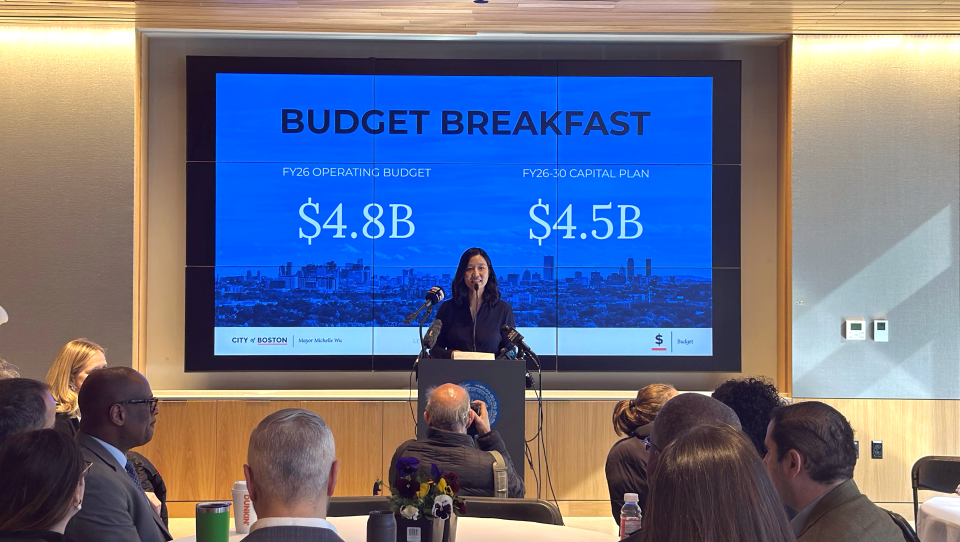Boston Mayor Michelle Wu Wednesday revealed a $4.8 billion operating budget that features no new hires and eliminatees the equivalent of nearly 500 jobs across several city departments for the new fiscal year. The spending plan represents a 4.4% increase when compared to the prior year’s budget.
The mayor described the budget as one that attempts to strike a balance between the looming political and financial uncertainty at the federal level and the need to maintain city services.
“Under this federal administration, the only daily constant is chaos and disruption and that means it falls to us at the city level to do our very best to partner, to collaborate, to hold strong and to make sure that we can be a source of stability and opportunity still for our residents,” the mayor said Wednesday.
Wu noted her own monitoring of “not pretty” financial markets and news headlines about federal policies that have already begun impacting Boston through reduced international tourism, , and through financial losses threatened for core industries like life sciences, healthcare and higher education.
“This budget affirms Boston as a home for everyone and, in very difficult times, continues to prioritize critical city services — public education and services for our youth and seniors, community safety and public health, climate resilience and mobility and housing affordability and economic opportunity,” Wu said.
Wu has previously disclosed that Boston relies on about $300 million in federal funding to contribute to city services. She said on Wednesday the budget proposes decreases in non-personnel items, a move she described as “a shared sacrifice” across all city departments.
Asked for more details about the proposed decreases, city finance chief Ashley Groffenberger said the cuts were limited to “smaller discretionary expenditures,” like food that the city can afford to pull back on.
Property taxes represent nearly three-quarters of the budget’s revenue source — a factor that brought the mayor to an impasse with Beacon Hill when she tried to gain temporary authority to tax Boston’s commercial property sector past the legal limit in an attempt lighten the tax levy for residential properties.
Wu said Wednesday she has not heard anything lately regarding the fate of her latest attempt currently pending on Beacon Hill.
The mayor’s proposal kicks off Boston’s spring budget season, with months ahead for her and the City Council to negotiate line items.
Wu said she has talked to councilors about ways to make sure residents in District 7 are represented in budget advocacy — the Roxbury-based district from which City Councilor Tania Fernandes Anderson is resigning following her a deal with prosescutors that includes pleading guilty to federal fraud charges.
“There have been examples like this in the past,” Wu said, “where the staff of that office remains on staff and able to deliver services, but it’s really at-large councilors and the council president who are stepping in to make sure that there’s advocacy.”
Council President Ruthzee Louijeune endorsed Wu’s proposal Wednesday, noting that the council took the unusual step of beginning public engagement on the budget several months before the mayor offered a proposal.
“The mayor’s proposed budget, therefore, reflects much of the council’s advocacy and much of what we’ve heard from community,” said Louijeune.
“As we review this budget and do our work, the council will continue to advocate for several of our key priorities,” said Louijeune, adding that mayor’s budget reflects many of the council’s priorities.
Others, including Boston Police Patrolmen’s Association President Larry Calderone and Massachusetts Municipal Association director Adam Chapdelaine, also endorsed Wu’s budget.
Over the past year, Wu came under criticism for introducing a budget that was 8% larger when compared the prior year. Some public officials and advocacy groups called for a leaner budget. Others called for dipping into the city’s reserves to offset costs.
“We resisted all of those knowing that the most responsible actions were to monitor and make sure that we’d be prepared for true economic uncertainty and potential financial crisis,” Wu said, responding to critics Wednesday. “It was never a question of whether Boston would be able to pay the bills through our budget.”
The mayor and the council must now finalize a budget for the new fiscal year that begins July 1.





